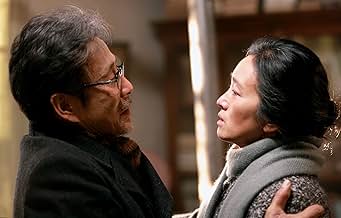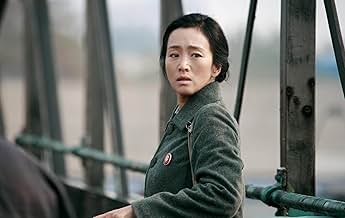Lu y Feng forman una pareja devota, forzada a la separación cuando Lu es detenido y llevado a un campo de trabajo para prisioneros políticos durante la Revolución Cultural. Cuando regresa a ... Leer todoLu y Feng forman una pareja devota, forzada a la separación cuando Lu es detenido y llevado a un campo de trabajo para prisioneros políticos durante la Revolución Cultural. Cuando regresa a casa, su amada no le reconoce.Lu y Feng forman una pareja devota, forzada a la separación cuando Lu es detenido y llevado a un campo de trabajo para prisioneros políticos durante la Revolución Cultural. Cuando regresa a casa, su amada no le reconoce.
- Dirección
- Guionistas
- Elenco
- Premios
- 23 premios ganados y 49 nominaciones en total
- Dirección
- Guionistas
- Todo el elenco y el equipo
- Producción, taquilla y más en IMDbPro
Opiniones destacadas
"Coming Home" (2014 release from China; 110 min.) brings the story of Lu, a "rightist bastard" during the Cultural Revolution. As the movie opens, we see a woman (Feng) and her daughter (Dandan) being called into the Propaganda Office of the girl's school, where they learn that Lu (the husband and father, respectively) has escaped from labor camp, and that they are not to see him. Feng and Lu nevertheless decide to meet up at the train station, where Lu gets captured again. We are then told "Three years later, the Cultural Revolution ends", and Lu arrives back home. Much to his shock, Feng does not recognize him. What caused Feng's amnesia? Will she ultimately recognize him? To tell you more would spoil your viewing experience, you'll just have to see for yourself how it all plays out.
Couple of comments: this is the latest movie from director Zhang Yimou (best known here for "House of the Flying Daggers"), Here he tackles a potentially sensitive topic in China, namely the horrible Cultural Revolution. But don't think that this is a political movie. Instead, it is a love story that happens to be set during and after the Cultural Revolution. Feng is played by the leading Chinese actress Gong Li (think of her as the Meryl Streep of China), and plays the role with restraint and visible hurt. Special mention also for the beautiful Zhang Huiwen in the role of Dandan (check out the ballet performances!). Last but not least, I couldn't help but notice that the piano you hear in the orchestral score is played by none other than Lang Lang. Bottom line: "Coming Home" is a slow-moving (in the best possible way) movie that examines the long shadows of the Cultural Revolution through the eyes of one particular couple.
This movie is now a year and a half, yet it recently showed up out of the blue at my local art-house theater here in Cincinnati. Better late than never I suppose. The weekday evening screening where I saw this at was attended poorly. A shame. If you are in the mood for a top-notch quality foreign movie that is light years away from your standard Hollywood fare, you may want to give this a try. "Coming Home" is HIGHLY RECOMMENDED!
Couple of comments: this is the latest movie from director Zhang Yimou (best known here for "House of the Flying Daggers"), Here he tackles a potentially sensitive topic in China, namely the horrible Cultural Revolution. But don't think that this is a political movie. Instead, it is a love story that happens to be set during and after the Cultural Revolution. Feng is played by the leading Chinese actress Gong Li (think of her as the Meryl Streep of China), and plays the role with restraint and visible hurt. Special mention also for the beautiful Zhang Huiwen in the role of Dandan (check out the ballet performances!). Last but not least, I couldn't help but notice that the piano you hear in the orchestral score is played by none other than Lang Lang. Bottom line: "Coming Home" is a slow-moving (in the best possible way) movie that examines the long shadows of the Cultural Revolution through the eyes of one particular couple.
This movie is now a year and a half, yet it recently showed up out of the blue at my local art-house theater here in Cincinnati. Better late than never I suppose. The weekday evening screening where I saw this at was attended poorly. A shame. If you are in the mood for a top-notch quality foreign movie that is light years away from your standard Hollywood fare, you may want to give this a try. "Coming Home" is HIGHLY RECOMMENDED!
I'm was born in early 90s in China. As I grow up, my parents always consciously saving up everything. They do not waste anything, food, clothes, etc..
My mom is good at stitching clothes. Even thou she can afford buying a new pair of socks, she chose to stitch up the worn ones. I thought I'd never understand why my parents are so thrifty, until I watched this movie.
I came to realize what a hard, tough and poor life my parents had went thru after watching this movie. I was even surprised that my parents could actually survived that period of time.
I realized that people don't need that much of things to survive. When my friend and I shopping in mall, talking about cosmetics and luxury bags, and living a wealthy and "fancy" life, while my mother when she was in my age, struggling to live, wearing the same clothes everyday, celebrating her birthday by only eating an egg, running after trains in order to pick up the "coal ball" (trains in old time use coal as the fuel and the coal ball is the coal which was not fully burned, and could still being used for generating a little heat).
This is a great movie to honor that harsh period of time in China's history. And I'm also glad to see that Chinese government now allows people to talk about that period of time and even make a movie about it.
My mom is good at stitching clothes. Even thou she can afford buying a new pair of socks, she chose to stitch up the worn ones. I thought I'd never understand why my parents are so thrifty, until I watched this movie.
I came to realize what a hard, tough and poor life my parents had went thru after watching this movie. I was even surprised that my parents could actually survived that period of time.
I realized that people don't need that much of things to survive. When my friend and I shopping in mall, talking about cosmetics and luxury bags, and living a wealthy and "fancy" life, while my mother when she was in my age, struggling to live, wearing the same clothes everyday, celebrating her birthday by only eating an egg, running after trains in order to pick up the "coal ball" (trains in old time use coal as the fuel and the coal ball is the coal which was not fully burned, and could still being used for generating a little heat).
This is a great movie to honor that harsh period of time in China's history. And I'm also glad to see that Chinese government now allows people to talk about that period of time and even make a movie about it.
By 'simple pleasures', I don't mean that in any way to reference the Chinese Cultural Revolution, but his return to simple films, about simple people, beautifully crafted, acted, and very revealing about everyday Chinese life (as much as he is able).
Zhang Yimou (Chinese names put the surname first, IMDb doesn't, alas) is arguably one of the best directors of the 20th and early 21st centuries (best known in the West for House of Flying Daggers). He always evokes a magical feeling in me, and I love his technique and precision; almost every frame is a painting. He chose to remain in mainland China and has walked a very thin tightrope in making the kinds of films he has, as he does not shy away from the political situation in China, at least as part of everyday people's lives, which it is, of course. His films are just not primarily about Chinese politics (although his simple, but great early film, The Story of Qiu Ju, is about Chinese bureaucracy, and was indeed banned for a time. The fact that Gong Li, in this film, screams to the prison officials that have come to capture her husband, "What did you do to him to make him want to escape?", turning the blame for his prison escape back onto them, illustrates what their intl fame allows them to get away with.
Gong Li, Zhang Yimou's ex-wife, is, I believe, the premiere female actress in China (and now known worldwide, since the wonderful film, Raise the Red Lantern, was nominated for an Oscar in 1990), with good reason, and an actress of incredible breadth and depth. Even though she has been on many 'most beautiful people' lists, (she is very made up here (or down!)), her craft is everything and I cannot watch her enough. She is lately known here for Memoirs of a Geisha, as the evil Hatsumomo.
I was very, very glad to see Zhang Yimou and Gong Li reunite, professionally, for 2 recent films. They seem to push each other upward and she makes a perfect muse for him.
Ah, the film...(I love telling people about them!). Coming Home is about a couple dealing with and trying to reunite after Gong Li's husband is imprisoned for a couple of decades during the Cultural Revolution in China. She grows progressively ill, which adds to their difficulties, thus the meat of the movie is about their reuniting difficulties. Definitely without a stock Hollywood ending! I was struck by one very incredible scene... It is just a walk across the kitchen by Gong Li, when her husband is knocking at her door. She has been warned severely by the police. This walk seems to take several hours as she haltingly walks across the floor, with all the ramifications, both political and personal, flashing across her face and obviously in her mind. It is one of the most astonishing 20 seconds of film I think I have ever seen, and done without dialog, melodrama or Hollywood artifice.
Zhang Yimou has crafted a fine film here. It is slow, but in a good way, which builds a lot of emotional suspense. Someone said it only covers the last 20-30 pages of the book upon which it is based. As usual, every aspect of the film is top notch and it walks on the edge of the dramatic sword in a perfectly balanced manner. It will go down as another of my favorite Zhang Yimou movies. Be patient, although the tension he creates will keep you pinned, if not a bit frustrated, but that is also the beauty of it, and enjoy! And check out some of his other films!
Zhang Yimou (Chinese names put the surname first, IMDb doesn't, alas) is arguably one of the best directors of the 20th and early 21st centuries (best known in the West for House of Flying Daggers). He always evokes a magical feeling in me, and I love his technique and precision; almost every frame is a painting. He chose to remain in mainland China and has walked a very thin tightrope in making the kinds of films he has, as he does not shy away from the political situation in China, at least as part of everyday people's lives, which it is, of course. His films are just not primarily about Chinese politics (although his simple, but great early film, The Story of Qiu Ju, is about Chinese bureaucracy, and was indeed banned for a time. The fact that Gong Li, in this film, screams to the prison officials that have come to capture her husband, "What did you do to him to make him want to escape?", turning the blame for his prison escape back onto them, illustrates what their intl fame allows them to get away with.
Gong Li, Zhang Yimou's ex-wife, is, I believe, the premiere female actress in China (and now known worldwide, since the wonderful film, Raise the Red Lantern, was nominated for an Oscar in 1990), with good reason, and an actress of incredible breadth and depth. Even though she has been on many 'most beautiful people' lists, (she is very made up here (or down!)), her craft is everything and I cannot watch her enough. She is lately known here for Memoirs of a Geisha, as the evil Hatsumomo.
I was very, very glad to see Zhang Yimou and Gong Li reunite, professionally, for 2 recent films. They seem to push each other upward and she makes a perfect muse for him.
Ah, the film...(I love telling people about them!). Coming Home is about a couple dealing with and trying to reunite after Gong Li's husband is imprisoned for a couple of decades during the Cultural Revolution in China. She grows progressively ill, which adds to their difficulties, thus the meat of the movie is about their reuniting difficulties. Definitely without a stock Hollywood ending! I was struck by one very incredible scene... It is just a walk across the kitchen by Gong Li, when her husband is knocking at her door. She has been warned severely by the police. This walk seems to take several hours as she haltingly walks across the floor, with all the ramifications, both political and personal, flashing across her face and obviously in her mind. It is one of the most astonishing 20 seconds of film I think I have ever seen, and done without dialog, melodrama or Hollywood artifice.
Zhang Yimou has crafted a fine film here. It is slow, but in a good way, which builds a lot of emotional suspense. Someone said it only covers the last 20-30 pages of the book upon which it is based. As usual, every aspect of the film is top notch and it walks on the edge of the dramatic sword in a perfectly balanced manner. It will go down as another of my favorite Zhang Yimou movies. Be patient, although the tension he creates will keep you pinned, if not a bit frustrated, but that is also the beauty of it, and enjoy! And check out some of his other films!
Spielberg "cried for an hour" did not lie. I felt like I had been stabbed and watched, and I felt like I was dehydrated when I left the cinema. The Chinese love, which is not fast-paced, is surrounded by the times and shows two sides.
Sometimes a movie comes along that requires your patience, but is worth every minute of your time. "Coming Home" (PG-13, 1:49) is one of those movies. It's a Chinese film, which, for most of us, means subtitles, but this film is from Yimou Zhang, the director of "Hero" and "House of the Flying Daggers", and stars Gong Li (also known as Li Gong), who starred in "House of the Flying Daggers" and "Memoirs of a Geisha", as well as "Hannibal Rising" and "Miami Vice". This film's pace is slow, but an open-minded audience member's reward will be a dramatic and heart-breaking romance that you won't soon forget.
The setting is China, during Communist Party Chairman Mao Zedong's "Cultural Revolution". Starting in 1966, and only really ending with Mao's death in 1976, this was a nationwide effort to purge remnants of capitalism and even Chinese culture which ran contrary to Chairman Mao's personal interpretation of communism. Party officials and local police publicly humiliated and harassed people, seized property, relocated many Chinese citizens, tortured some and arbitrarily imprisoned others. One of those was a college professor named Lu Yanshi (Daoming Chen), whose time in Chinese labor camps kept him away from his wife, Feng Wanyu (Gong Li) and young daughter Dandan (Huiwen Zhang) for a total of 20 years.
As the film opens, Feng and her teenage daughter are summoned to the office of a party official who informs them that Lu has escaped from prison. The official sternly reminds them that failure to report any contact with Lu is a crime. The thoroughly indoctrinated Dandan responds obediently by spouting a line of communist propaganda. Feng merely responds that she understands. Lu does try to rejoin his family, resulting in some of the most tense and best-acted scenes I've ever watched on the big screen.
It is only after the Cultural Revolution ends that Lu can return home safely. By that time, Feng is suffering from a type of amnesia that requires her to refer to notes so she can accomplish ordinary daily tasks and, tragically, also renders her unable to recognize her husband. She remembers Feng as a young man, but when she finally sees him face to face, she mistakes him for a party official whom she hates and she kicks him out of the house. No one, can convince her that the man she has turned away really is Lu – not the local communist party officials and not even Feng's own daughter who has grown up to regret the ways she had denied or been disloyal to her father. Neither the audience, nor Lu himself knows whether, the next time Feng sees him, she'll mistake him for an old enemy, think that he is a piano tuner or a friendly neighbor, or even acknowledge him at all.
Lu takes up residence in an abandoned store across the street and his daughter, now living on her own, establishes a relationship with Lu and works with him to try overcoming her mother's amnesia. Feng receives a long-delayed letter from Lu telling her that he's coming home "on the 5th of the month". She readies the house in anticipation, even as she sees Lu around the neighborhood on a regular basis, but never recognizes him. Lu and Dandan talk to Feng's doctor and try various strategies, direct and indirect, hoping to get Feng to remember her heart-broken husband. Meanwhile, on the 5th of every month, Feng journeys to the train station and holds a hand-made sign with her husband's name on it until the last of the passengers have descended the long, stone staircase and the workers close the large, metal gates.
"Coming Home" is a combination of the 1965 classic romance "Doctor Zhivago" and the more modern romance in 2004's "The Notebook", but with a distinct Chinese sensibility. The setting, however, is merely background. This film has the potential to deeply affect people regardless of age or nationality. The acting is truly outstanding, especially from Gong Li who lives completely in every moment of this film, acts with every cell of her body and gives a performance for the ages. This film is so well written, directed, acted and edited that it requires no understanding of the Chinese language and no knowledge of Chinese history or culture to enjoy and appreciate this timeless tale of love, loss and redemption. It may sound trite, but the language of love truly is universal. That, and the other emotions and relationships that are part of this story require nothing more than a human heart to understand. I'd rather that this film had incorporated a little more variation in tone and pacing, but there is no denying this film's power to use the emotions of its characters to touch the emotions of its audience. "A-"
The setting is China, during Communist Party Chairman Mao Zedong's "Cultural Revolution". Starting in 1966, and only really ending with Mao's death in 1976, this was a nationwide effort to purge remnants of capitalism and even Chinese culture which ran contrary to Chairman Mao's personal interpretation of communism. Party officials and local police publicly humiliated and harassed people, seized property, relocated many Chinese citizens, tortured some and arbitrarily imprisoned others. One of those was a college professor named Lu Yanshi (Daoming Chen), whose time in Chinese labor camps kept him away from his wife, Feng Wanyu (Gong Li) and young daughter Dandan (Huiwen Zhang) for a total of 20 years.
As the film opens, Feng and her teenage daughter are summoned to the office of a party official who informs them that Lu has escaped from prison. The official sternly reminds them that failure to report any contact with Lu is a crime. The thoroughly indoctrinated Dandan responds obediently by spouting a line of communist propaganda. Feng merely responds that she understands. Lu does try to rejoin his family, resulting in some of the most tense and best-acted scenes I've ever watched on the big screen.
It is only after the Cultural Revolution ends that Lu can return home safely. By that time, Feng is suffering from a type of amnesia that requires her to refer to notes so she can accomplish ordinary daily tasks and, tragically, also renders her unable to recognize her husband. She remembers Feng as a young man, but when she finally sees him face to face, she mistakes him for a party official whom she hates and she kicks him out of the house. No one, can convince her that the man she has turned away really is Lu – not the local communist party officials and not even Feng's own daughter who has grown up to regret the ways she had denied or been disloyal to her father. Neither the audience, nor Lu himself knows whether, the next time Feng sees him, she'll mistake him for an old enemy, think that he is a piano tuner or a friendly neighbor, or even acknowledge him at all.
Lu takes up residence in an abandoned store across the street and his daughter, now living on her own, establishes a relationship with Lu and works with him to try overcoming her mother's amnesia. Feng receives a long-delayed letter from Lu telling her that he's coming home "on the 5th of the month". She readies the house in anticipation, even as she sees Lu around the neighborhood on a regular basis, but never recognizes him. Lu and Dandan talk to Feng's doctor and try various strategies, direct and indirect, hoping to get Feng to remember her heart-broken husband. Meanwhile, on the 5th of every month, Feng journeys to the train station and holds a hand-made sign with her husband's name on it until the last of the passengers have descended the long, stone staircase and the workers close the large, metal gates.
"Coming Home" is a combination of the 1965 classic romance "Doctor Zhivago" and the more modern romance in 2004's "The Notebook", but with a distinct Chinese sensibility. The setting, however, is merely background. This film has the potential to deeply affect people regardless of age or nationality. The acting is truly outstanding, especially from Gong Li who lives completely in every moment of this film, acts with every cell of her body and gives a performance for the ages. This film is so well written, directed, acted and edited that it requires no understanding of the Chinese language and no knowledge of Chinese history or culture to enjoy and appreciate this timeless tale of love, loss and redemption. It may sound trite, but the language of love truly is universal. That, and the other emotions and relationships that are part of this story require nothing more than a human heart to understand. I'd rather that this film had incorporated a little more variation in tone and pacing, but there is no denying this film's power to use the emotions of its characters to touch the emotions of its audience. "A-"
¿Sabías que…?
- TriviaGui lai (2014) had its international premiere at the 2014 Cannes Film Festival in the out of competition section. It was scheduled to be screened in the Special Presentations section of the 2014 Toronto International Film Festival.
- ConexionesFeatured in Sven Uslings Bio: Bästa filmer 2020 Del 1: Plats 20-11 (2021)
- Bandas sonorasSong of the Fishermen
Written by Ren Guang
Arranged by Quigang Chen
Selecciones populares
Inicia sesión para calificar y agrega a la lista de videos para obtener recomendaciones personalizadas
- How long is Coming Home?Con tecnología de Alexa
Detalles
Taquilla
- Total en EE. UU. y Canadá
- USD 377,607
- Fin de semana de estreno en EE. UU. y Canadá
- USD 26,361
- 13 sep 2015
- Total a nivel mundial
- USD 47,587,984
- Tiempo de ejecución1 hora 49 minutos
- Color
- Mezcla de sonido
- Relación de aspecto
- 2.35 : 1
Contribuir a esta página
Sugiere una edición o agrega el contenido que falta



































